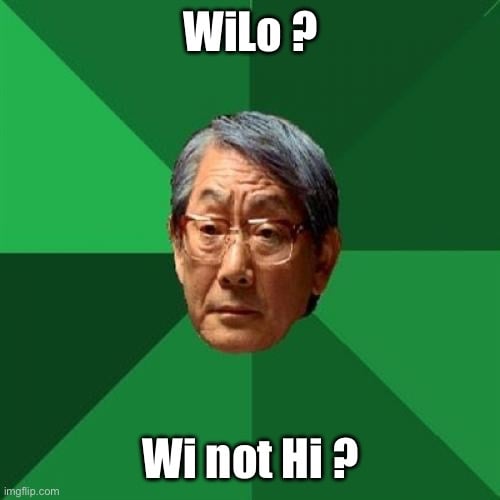Why not Willow
Technology
This is a most excellent place for technology news and articles.
Our Rules
- Follow the lemmy.world rules.
- Only tech related content.
- Be excellent to each another!
- Mod approved content bots can post up to 10 articles per day.
- Threads asking for personal tech support may be deleted.
- Politics threads may be removed.
- No memes allowed as posts, OK to post as comments.
- Only approved bots from the list below, to ask if your bot can be added please contact us.
- Check for duplicates before posting, duplicates may be removed
Approved Bots
How is this different to HaLow?

They have plash speed wifi
WiHi is already taken in Japanese for WiFi. They write WiFi but can't pronounce WiFi (there is no Fi sillable), so they say WiHi. Source: I lived in Japan for a while.
Wireless Hidelity?
HIDEO
Kinda weird that their only syllable with F sound is Fu, which goes in the Ha-He-Hi-Ho column
Technically there is no Hi syllable in Japanese either. There is ひ, which phonologically is neither "Hi" nor "Fi", but somewhere in between. The exact pronunciation varies depending on surrounding sounds, as well as the speaker's regional accent.
So I wouldn't say they really use WiHi. They write WiFi and they say "ワイハイ" which is the closest you can get to WiFi using Japanese sounds. It will kinda sound like WiHi to an English speaker.
I don't know where you get the information tho, it's factually false.
Japanese have have /h/, /ç/, /ɸ/ consonants in ハ行 (written as ha - hi - fu or hu -he - ho but pronounced differently). The consonant /ɸ/ is generally transcribed as f in alphabet.
フ(f+u) is the only letter that pronaunce /ɸ/ in regular ハ行, but ファ行 (f + other vowels) indicates sounds with /ɸ/.
Transcription of wifi in Japanese is ワイファイ, not ワイハイ.
This will still be not accessible in my room!
Nothing a hammer drill, CAT.7 cable and an access point couldn't fix.
I mean, if you insist on sitting in the fridge what do you expect!
This article leaves me with more questions than answers
No thanks! 👍 Is there any way we could make a standard where unknown servers trying to run apps from google locally on my devices could be auto blocked? I'd love a standard like that.
"Hey we removed Google photos since they turned on the camera without your consent. We did that remotely! While you were out "
That WiFi, I would like.
How can an app turn on the camera without your consent?
Duct tape fell off
I mean, you have to explicitly give permission before apps can access the camera.
Can't work for 3-letter agencies with that attitude